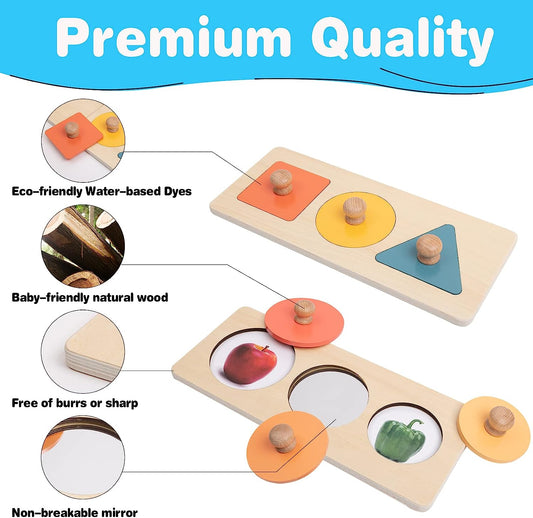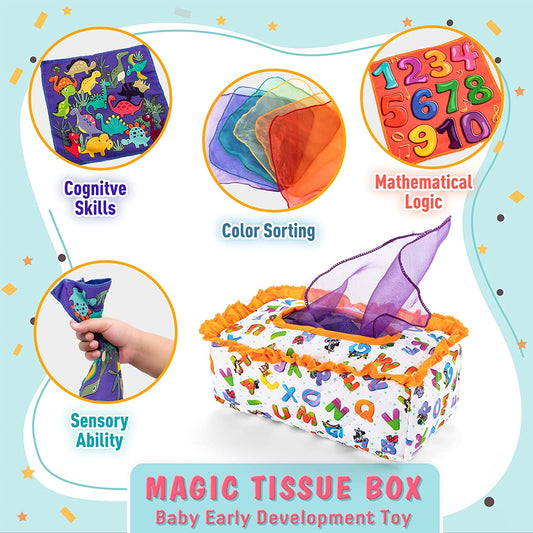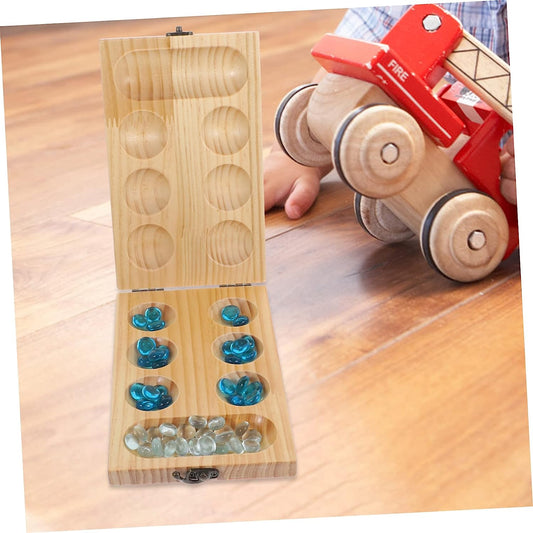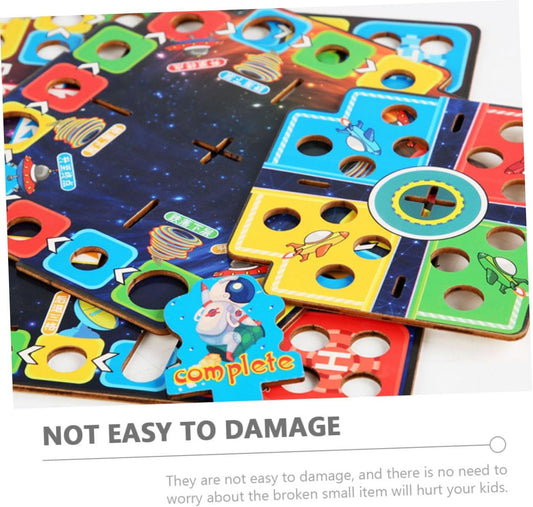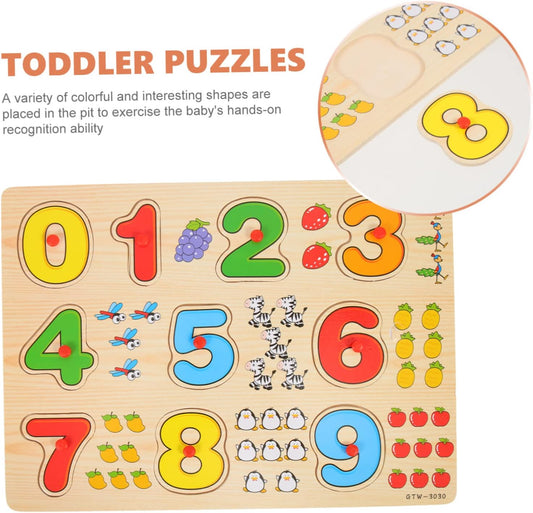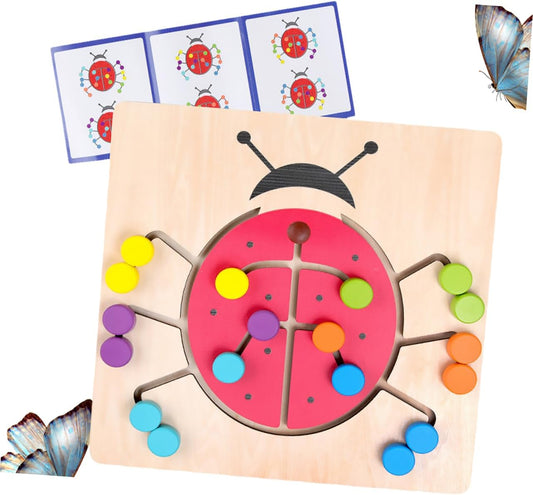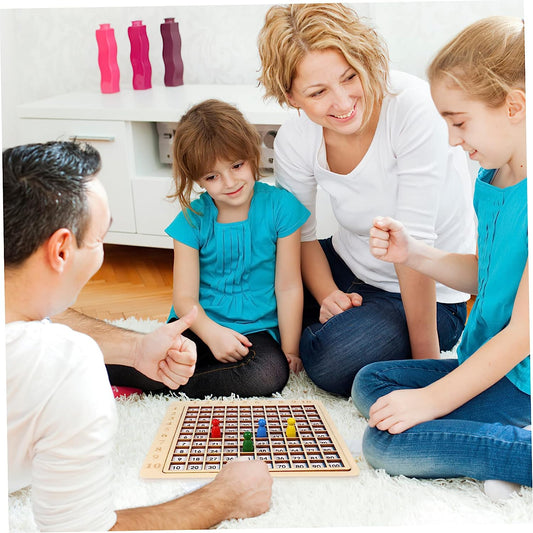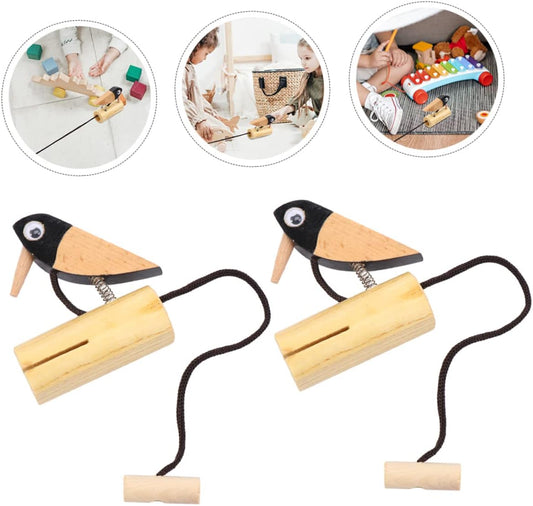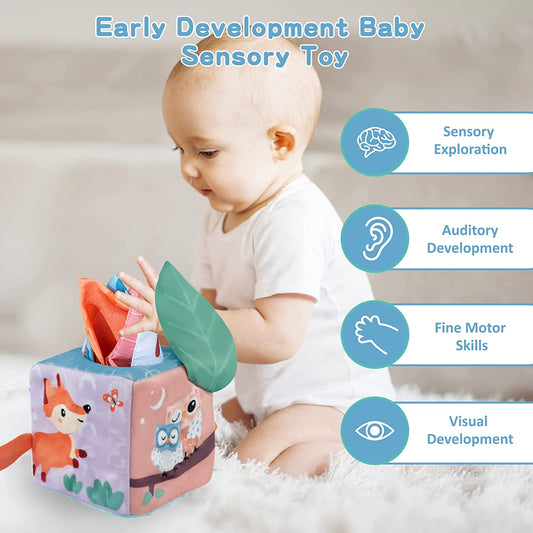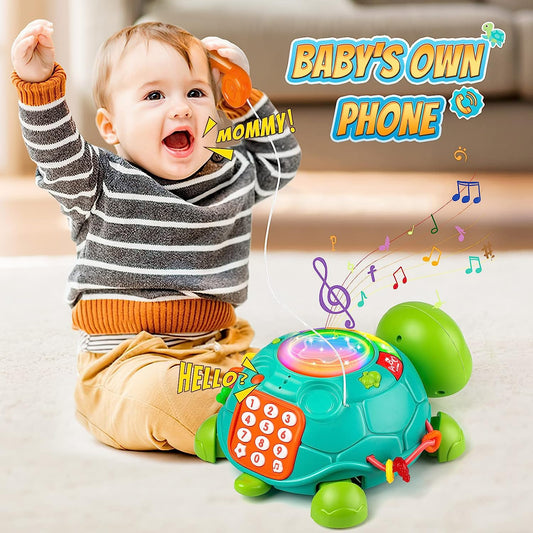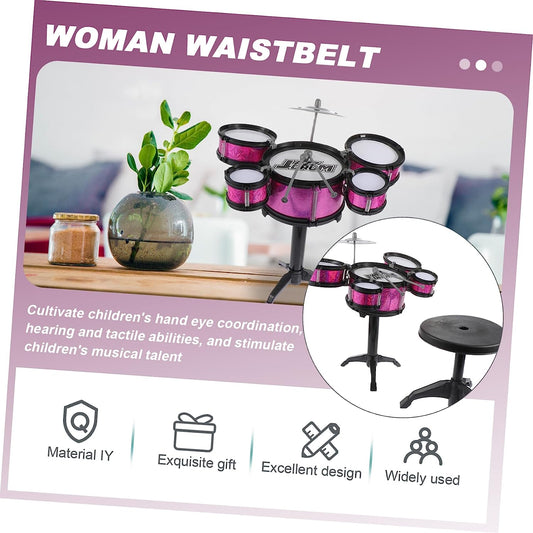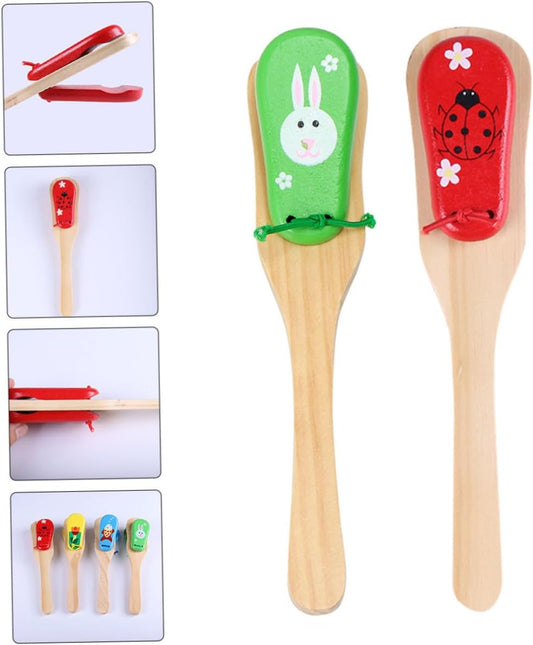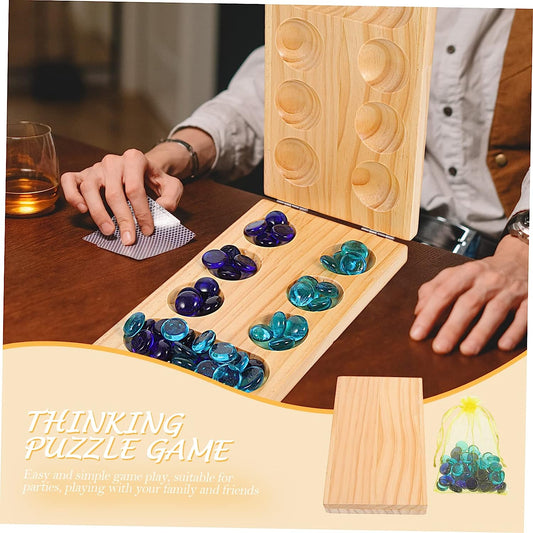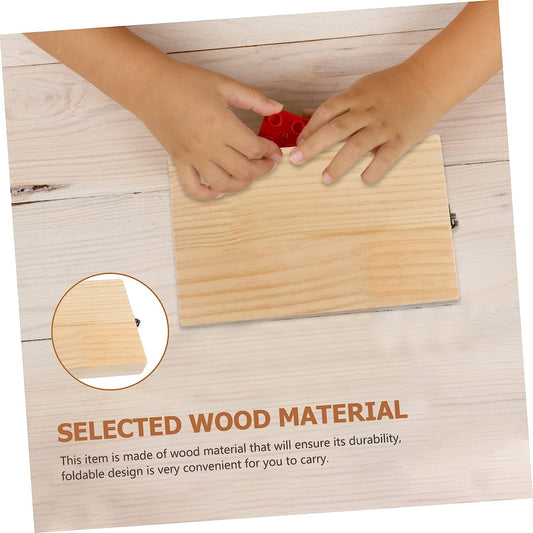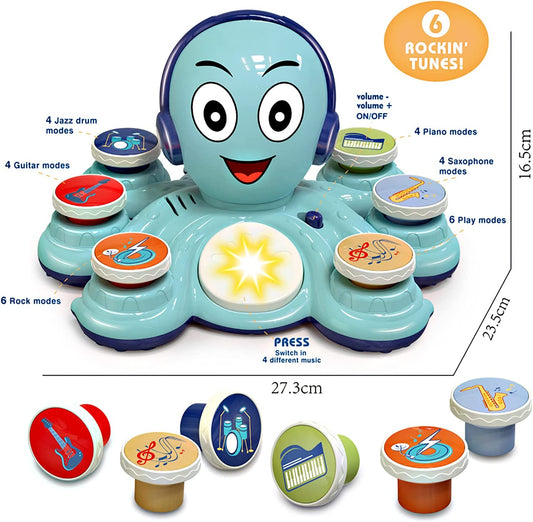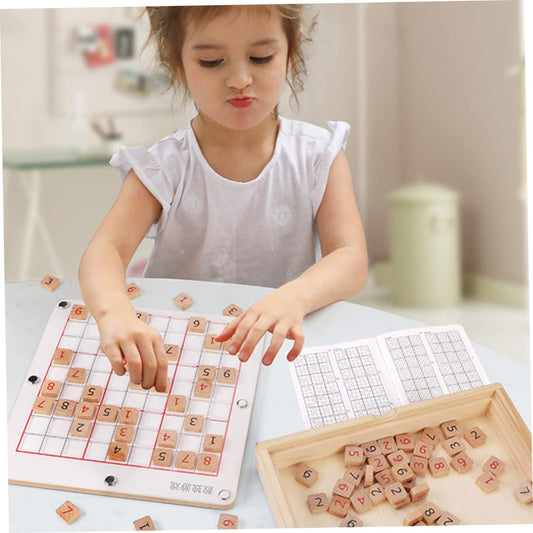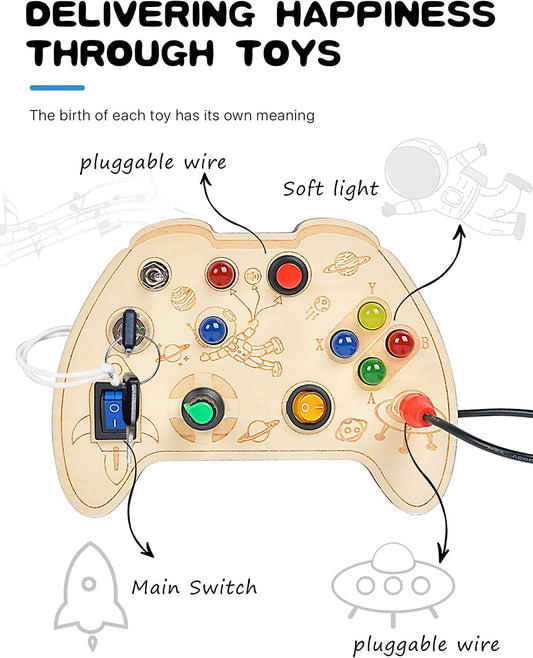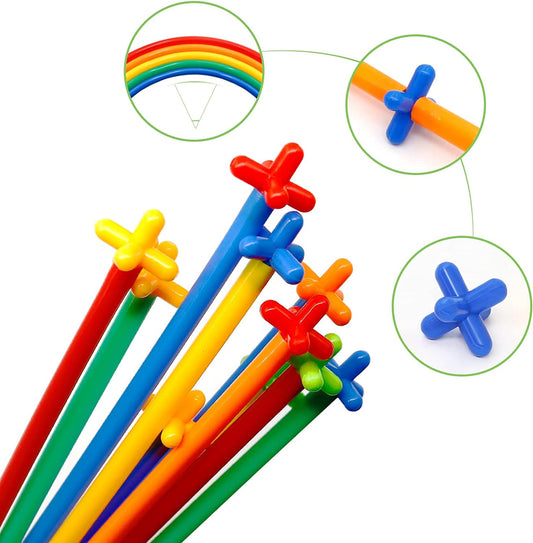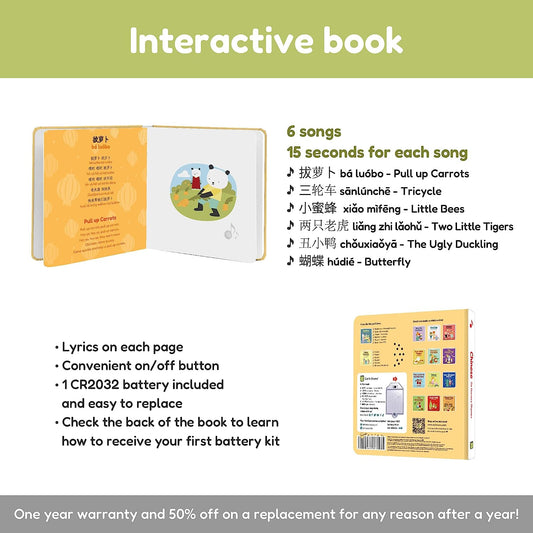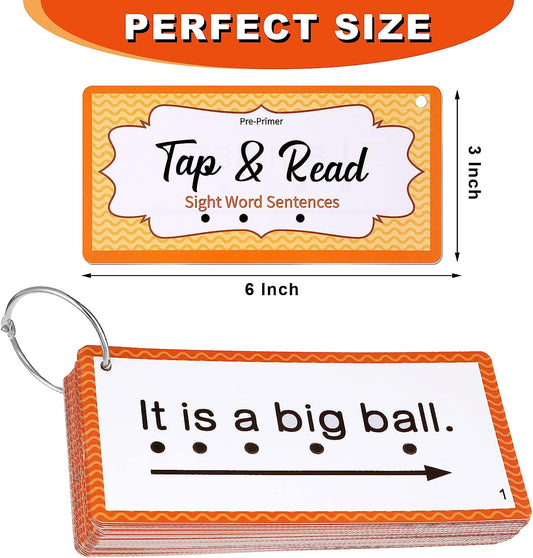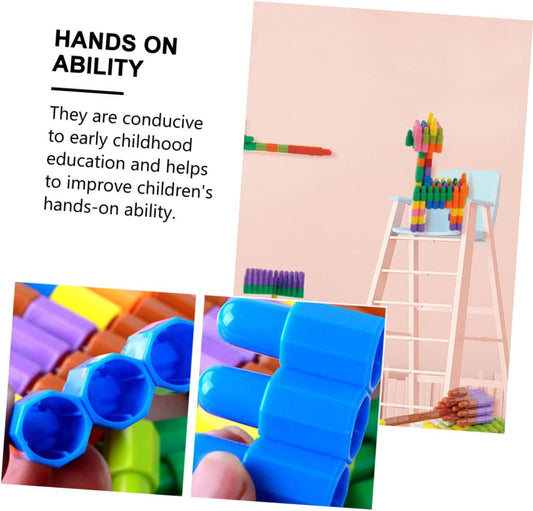-
Baby Puzzles 12-18 Months - Multiple Shapes Knob Wooden Puzzles for Toddlers 1-3 - Peekaboo Photo Puzzle with Baby Mirror & 10 Real-Life Cards
Regular price $29.99 USDRegular priceUnit price / per$34.49 USDSale price $29.99 USDSale -
Baby Toys 6 to 12 Months, Toys for Babies 6-12 Months, Soft Baby Magic Tissue Box, Infants Contrast Crinkle Sensory Toy for 1 Year Old Boys Girls Kids Early Learning Toys Baby Gifts
Regular price $20.34 USDRegular priceUnit price / per$25.02 USDSale price $20.34 USDSale -
Carrom Board 1 Set Mancala Wooden Educational Wooden Mancala Game Thinking Puzzle Game Board Games Puzzle Chess Wood, Glass Beads Portable Gemstones for Boggle
Regular price $24.22 USDRegular priceUnit price / per$33.66 USDSale price $24.22 USDSale -
1 Set Three-Dimensional Flying Chess Wooden Chess Board Travel Chess Board Wooden Play Food Set 3D Flying Chess Plaything Checkers Toy Early Educational Toy Game Chess Colorful 3D
Regular price $21.17 USDRegular priceUnit price / per$26.67 USDSale price $21.17 USDSale -
2 Sets Early Childhood Education Puzzle Number Toys Wooden Toys for Babies Educational Toys Gifts for 1 Year Old Girl Toys for 2 Year Old Letter Puzzles Block Puzzle Toy
Regular price $19.07 USDRegular priceUnit price / per$26.89 USDSale price $19.07 USDSale -
Beetle Maze Walking Puzzle Toy Girl Toddler Toys Wooden Puzzle Toys for Girls Educational Playthings Children Toys Baby Early Educational Toys Baby Bamboo Shaping Checkerboard Red
Regular price $33.20 USDRegular priceUnit price / per$38.52 USDSale price $33.20 USDSale -
3pcs Desktop Interactive Game Kids Play Sets Kids Educational Toys Baby Educational Toys Manipulative Toys Preschool Counting Toy Math Counting Toys Preschool Toy Set Addition Toys
Regular price $42.77 USDRegular priceUnit price / per$53.89 USDSale price $42.77 USDSale -
2pcs Garden Decoration Kids Musical Instruments Wood Toys Kidcraft Playset Kids Percussion Toy Kids Wooden Bird Toy Woodpecker Worm Game Music Teachings Aids Doorbell Sound Barrel
Regular price $18.95 USDRegular priceUnit price / per$27.29 USDSale price $18.95 USDSale -
Baby Tissue Box Toy, Toy for Babies 6-12 Months, Magic Tissue Box Baby Sensory Toys for 1 Year Old Boy Girl, Early Learning Baby Infant Toys 6 to 12 Months
Regular price $29.99 USDRegular priceUnit price / per$38.08 USDSale price $29.99 USDSale -
Baby Toys 6 to 12 Months, Musical Turtle Crawling Baby Toys with Pretend Phone Call, Light Up Educational Toys for 1 2 Year Old, Birthday Gifts for Infant Toddler Boy Girl 3-6-12-18 Months
Regular price $26.39 USDRegular priceUnit price / per$38.26 USDSale price $26.39 USDSale -
3 Sets Simulated Jazz Drum Baby Gifts Kids Suit Toys for Kids Toddler Baby Musical Toy Toddler Drum Toy Gift Musical Drum Set Toy Percussion Rosy Metal Fittings Mini Toddler
Regular price $50.54 USDRegular priceUnit price / per$59.64 USDSale price $50.54 USDSale -
6 Pcs Castanets Kids Musical Instruments Kids Wooden Toys Puzzle Toy Baby Drum Rattle Castanets Wood Castanets Toy Hand Castanets Kids Toy Children Musics Toy Castanet Instrument
Regular price $23.17 USDRegular priceUnit price / per$33.60 USDSale price $23.17 USDSale -
1 Set Mancala Portable Chess Travel Chess Travel Chess Board Mancala Game Mancala Board Mancala Board Game Mancala Toy Wooden Mancala Portable Mancale Classic Wooden Child Boy Girl
Regular price $21.17 USDRegular priceUnit price / per$27.94 USDSale price $21.17 USDSale -
1 Set Mancala Kidcraft Playset Gemstones for Portable Chess Wood Mancala Plaything Portable Mancale Wooden Bead Board Game Puzzle Wood, Glass Beads Training Chess
Regular price $24.77 USDRegular priceUnit price / per$36.66 USDSale price $24.77 USDSale -
Baby Musical Toys Learning Toys for Toddlers, Octopus Music Toys, Preschooler Musical Educational Instruments Toy for Baby, Birthday Toys for Girls Boys
Regular price $47.99 USDRegular priceUnit price / per$66.22 USDSale price $47.99 USDSale -
1pc Sudoku Game Chess Wooden Puzzles Wooden Puzzles Wood Wood Sudoku Training Tool 9 Grids Game Chess Sudoku Plaything Ceramic Tile Preschool Jiugongge Puzzles
Regular price $20.46 USDRegular priceUnit price / per$25.78 USDSale price $20.46 USDSale -
Busy Board Toy for 1 2 3 Year Old Boy, Wooden Controller Sensory Toy for Autistic Children with LED Light Up Buttons, Early Learning Fidget Toy Great for Gift
Regular price $29.99 USDRegular priceUnit price / per$40.78 USDSale price $29.99 USDSale -
22.4" Fast Sling Puck Game Wooden Hockey Game, 3 Levels Challenge 2-4 Players Family Board Game, Tabletop Slingshot Hockey Game, Foosball Winner Game for Kids, Teens and Family Game Night
Regular price $43.19 USDRegular priceUnit price / per$61.76 USDSale price $43.19 USDSale -
Creative Straw Toys 450Pcs STEM Building Toys Aged for 3 4 5 6 7+ Preschool Kids Constructor Toy Thin Tube Toy DIY Educational Toy Interlocking Plastic Engineering Toys Kit for Boys and Girls Gift
Regular price $23.99 USDRegular priceUnit price / per$33.34 USDSale price $23.99 USDSale -
Chinese Nursery Rhymes Book - Sing-Along Sound Books for Toddlers 1-3. Interactive Educational Music Toys for Bilingual Children with Lyrics & Translation
Regular price $29.99 USDRegular priceUnit price / per$42.88 USDSale price $29.99 USDSale -
1 Set Cowhide Drum Percussion Drum Year of The Rabbit Drum Performance Drum Toys for Infants Kids Educational Toys Toddler Drum Set Drums Percussion Toy Child Drum Music
Regular price $33.80 USDRegular priceUnit price / per$49.69 USDSale price $33.80 USDSale -
60 Pcs Sight Word Sentence Cards Kindergarten Flash Cards Preschool Kids Educational Word Flashcards for Early Childhood Education Sight Word Games Frequency Sight Word Sentences
Regular price $22.79 USDRegular priceUnit price / per$31.22 USDSale price $22.79 USDSale -
1000 Pcs Letters for Crafts, Wood Tiles, DIY Wood Gift Decoration, Making Alphabet Coasters and Crossword Game
Regular price $21.59 USDRegular priceUnit price / per$26.34 USDSale price $21.59 USDSale -
1 Set 270pcs Splicing Toys Boys Toy Kids Educational Toys Kidcraft Playset Logical Game Toys Building Blocks with Drawing Kids Building Blocks Puzzle Rocket Head Module Bullet
Regular price $31.39 USDRegular priceUnit price / per$37.04 USDSale price $31.39 USDSale
Collection: Early Childhood Fun
Fun For The Little Ones: Your Guide To Early Childhood Fun
Hey there, parent! Did you know that children learn and grow the most during their early childhood years? In fact, research shows that 90% of a child's brain development happens before they even step foot in a kindergarten classroom. That's pretty incredible, right?
Well, worry not! We've got you covered with our ultimate guide to early childhood fun. We understand that keeping your little ones engaged and entertained can sometimes be a challenge, especially when you're juggling multiple responsibilities. But fear not - we've compiled a list of activities and resources that will not only provide endless fun but also help foster their development.
From sensory play ideas that stimulate their senses to educational toys and games that promote learning, we've got it all. Let your little explorers embark on outdoor adventures or dive into the magical world of storytime with our book recommendations. Watch as music and movement enhance their creativity and coordination skills, or let them unleash their inner scientists with exciting science experiments for kids.
We haven't forgotten about those gross motor skills either - we have activities specially designed to get those little bodies moving! And because social and emotional development is just as important as cognitive growth, we'll give you tips on how to nurture these aspects too.
So sit back, relax (if you can), and let us guide you through this amazing journey of early childhood fun. Trust us, these moments are precious and hold immense power in shaping your child's future.
Key Takeaways
- Early childhood is a critical period for brain development, with 90% of it occurring before kindergarten.
- Sensory play activities, such as water play and sensory bins, can stimulate senses and promote fine motor skills, hand-eye coordination, and cognitive development.
- Engaging children in educational toys, games, apps, and websites can foster early learning and introduce concepts in science, technology, engineering, and math (STEM).
- Outdoor adventures, nature exploration, and playground games can spark imagination, promote love for nature, and provide opportunities for physical and social development.
Sensory Play Ideas
Get ready to dive into a world of sensory play, where you'll discover new and exciting ways for your little ones to explore and engage with their senses!
Sensory play ideas are perfect for stimulating young minds and helping them develop important skills. One popular option is water play fun. Set up a small table or tub filled with water and let your child splash around, feeling the cool sensation on their skin. Add some cups, spoons, and toys for added exploration. They can pour water from one container to another or even experiment with sinking and floating objects.
Another great sensory play idea is creating a sensory bin filled with different materials such as rice, beans, or sand. Let your child dig their hands in it, feeling the textures and exploring how they move through their fingers. You can also add objects like plastic animals or small scoops for more imaginative play.
By engaging in sensory play activities like these, your child will not only have fun but also enhance their fine motor skills, hand-eye coordination, and cognitive development.
Now that you've explored some amazing sensory play ideas, let's move on to the next section about educational toys and games that will continue to stimulate your little one's growing mind.
Educational Toys and Games
Are you looking for engaging and educational toys and games to support your child's early learning?
STEM toys are a great way to introduce your little one to the world of science, technology, engineering, and math. They can help develop problem-solving skills and critical thinking abilities while having fun.
Board games are another fantastic option for cognitive development as they encourage strategic thinking, logical reasoning, and social interaction.
Lastly, educational apps and websites provide interactive learning experiences that can enhance your child's knowledge in various subjects.
With these resources at hand, your child will be on their way to becoming a curious and lifelong learner!
STEM Toys for Early Learning
STEM toys can provide an engaging learning experience for young children, with research showing that 60% of parents believe these toys improve their child's problem-solving skills.
Here are some STEM toys and activities that are perfect for preschoolers and toddlers:
-
Building blocks: These toys allow children to explore shapes, colors, and patterns while developing their fine motor skills.
-
Science kits: With age-appropriate experiments, kids can learn about basic scientific concepts like gravity and magnetism in a fun and interactive way.
-
Coding games: There are coding games specifically designed for young children to introduce them to the basics of programming.
By incorporating these STEM toys into playtime, you can encourage your little ones' curiosity, critical thinking, and creativity.
Next up is the section on board games for cognitive development.
Board Games for Cognitive Development
Try incorporating board games into your child's playtime to enhance their cognitive development. Board games provide a fun and interactive way for children to learn important skills such as problem-solving, critical thinking, and memory retention.
Games like interactive puzzles challenge your little one's problem-solving abilities as they work to fit the pieces together. Memory games help improve their concentration and memory skills as they try to remember where different cards are located.
These activities engage their minds while providing enjoyment at the same time. Moving on to the next section about educational apps and websites, you'll discover even more ways to stimulate your child's learning potential.
Educational Apps and Websites
Take advantage of the multitude of educational apps and websites available to you, providing a stimulating and interactive way for your child to expand their knowledge and skills.
Educational apps offer a wide range of subjects, from math and science to reading and coding, all designed to make learning fun.
Online learning platforms provide access to virtual classrooms, where your child can interact with teachers and classmates in an engaging environment.
These resources allow children to learn at their own pace while developing essential skills like problem-solving and critical thinking.
With educational apps and online learning, your child can explore new topics, reinforce what they've learned in school, or even discover hidden talents.
So why wait? Dive into the world of digital education today!
As we move on to outdoor adventures, remember that learning doesn't stop when you step outside.
Outdoor Adventures
Outdoor adventures are a fantastic way to spark your child's imagination and foster their love for nature. There are so many exciting activities that can be done outdoors, allowing children to explore the wonders of the natural world while having fun.
Here are five outdoor adventures that will leave your little ones in awe:
-
Nature exploration: Take your child on a hike through the woods or visit a nearby park where they can discover different plants and animals. Encourage them to observe and ask questions about everything they see.
-
Playground games: Head to the local playground and let your child run wild with their friends. From swinging high in the sky to climbing up challenging structures, they'll have a blast while developing their motor skills.
-
Treasure hunts: Create an outdoor treasure hunt by hiding small objects or clues around your backyard or neighborhood. This activity promotes problem-solving skills and gets kids excited about exploring their surroundings.
-
Bug hunting: Grab a magnifying glass and go on a bug-hunting expedition. Your little ones will love observing insects up close, learning about their habitats, and discovering fascinating facts about these tiny creatures.
-
Gardening: Get dirty together by starting a small garden with your child. Let them choose what plants they want to grow and teach them how to care for them. This hands-on activity teaches responsibility, patience, and helps develop an appreciation for nature's cycles.
Now that you've had some outdoor fun, it's time for storytime!
Storytime and Book Recommendations
Are you looking for fun and interactive ways to engage your little ones during storytime?
In this discussion, we'll explore some exciting storytelling ideas that'll capture their imagination and keep them entertained.
We'll also share some of our favorite children's books that are sure to become bedtime favorites.
Plus, discover the many benefits of reading aloud to your child, from language development to fostering a love for books.
So grab a cozy spot and get ready for an adventure through the world of stories!
Interactive Storytelling Ideas
Get ready to be amazed as you immerse your little ones in a world of wonder through interactive storytelling ideas!
Here are four exciting activities that will engage their senses and spark their imaginations:
-
Sensory Story Bag: Fill a bag with different objects that relate to the story you're telling. As you read, let your child reach in and pull out each item, encouraging them to describe how it feels or what it reminds them of.
-
Puppet Play: Use puppets or stuffed animals to act out the story. Let your child take turns being the storyteller and have fun creating unique voices for each character.
-
Musical Storytime: Incorporate music into your storytelling by singing songs that go along with the plot or using instruments to create sound effects. This multisensory experience will make the story come alive!
-
Storytelling Walk: Take your little one on an adventure outdoors while narrating a story. Point out things along the way that relate to the tale, like animals or natural elements.
With these interactive storytelling activities, your child's imagination will soar and their love for books will flourish! Now let's dive into some of our favorite children's books...
Favorite Children's Books
Immerse your child in a world of wonder with these captivating interactive storytelling ideas that'll spark their imagination and engage their senses.
Reading aloud is a great way to introduce your child to the joy of books, but why not take it one step further with sensory play ideas? Use props or create a sensory bin that corresponds with the story, allowing your child to touch, smell, and see the elements from the book.
For example, if you're reading 'The Very Hungry Caterpillar,' set up an outdoor adventure where your child can search for different fruits and pretend to be the caterpillar. This hands-on approach not only enhances their comprehension skills but also makes reading more enjoyable.
By incorporating sensory play into storytelling, you'll create lasting memories and foster a love for reading in your little one's heart.
Benefits of Reading Aloud
Engaging in read-aloud sessions with your child not only fosters a love for literature, but also unlocks a world of endless possibilities. By reading aloud to your little one, you are introducing them to the magic of storytelling and igniting their imagination.
Interactive storytelling activities, such as asking questions about the story or encouraging your child to make predictions, can help develop their critical thinking skills. Additionally, reading aloud exposes children to new vocabulary and language patterns, enhancing their communication skills.
The benefits of early literacy extend beyond just language development; it also promotes cognitive growth and emotional well-being. As you embark on this journey of reading together, you are nurturing a lifelong love for learning in your child.
Now let's delve into the exciting world of music and movement!
Music and Movement
Let's have a blast with music and movement, the perfect way to keep your little ones entertained and active! Music has a powerful effect on children, not only bringing joy but also promoting their development. Research has shown that music therapy can enhance cognitive skills, language development, and emotional well-being in young children.
So why not turn up the tunes and dance around with your little one? Dance fitness is another fantastic way to engage your child's body and mind. It combines movement with music, allowing them to express themselves while getting some exercise. Dancing helps develop coordination, balance, and flexibility – all crucial for growing bodies.
You can make this activity even more enjoyable by creating a dance routine together or using props like scarves or ribbons to add an extra element of fun. Let your child take the lead and watch as they twirl, jump, and spin their way through an imaginary world of excitement.
As we move on to the next section about arts and crafts, remember that music and movement are just one part of the incredible journey you're taking with your little one. So grab some art supplies because there's so much more fun waiting for you both!
Arts and Crafts
Get ready to dive into the wonderful world of arts and crafts, where you can unleash your creativity and explore endless possibilities with your kiddos! Arts and crafts are not only a fun way to spend time together, but they also promote cognitive development and fine motor skills in little ones.
One classic art activity that kids love is paper mache. Grab some old newspapers, mix up a paste using flour and water, and let the magic begin! Encourage your child to tear the newspaper into strips and dip them into the paste before layering them onto a balloon or a cardboard shape. Once it dries, they can paint their creation however they like!
Another popular art activity is finger painting. Set up a large sheet of paper or use an easel if you have one, squeeze some non-toxic finger paints onto plates or palettes, and let your child go wild with their fingers! Finger painting allows children to explore different textures, colors, and shapes while developing hand-eye coordination.
Now that you've explored the colorful world of arts and crafts, why not continue the fun indoors with some exciting play ideas? Let's discover all the imaginative games we can play without stepping outside!
Indoor Play Ideas
Indoor playtime offers a multitude of opportunities for imaginative adventures and endless entertainment. When the weather outside isn't ideal, you can create your own indoor obstacle course using everyday household items like pillows, cushions, and furniture. Build tunnels to crawl through, balance beams with tape on the floor, and set up a mini basketball hoop for some friendly competition. Let your imagination run wild as you pretend to be explorers navigating through treacherous terrain or superheroes saving the day.
If obstacle courses aren't your thing, there are plenty of other imaginative play ideas to keep you entertained indoors. Set up a puppet show using socks or stuffed animals as your characters. Create a fort out of blankets and chairs where you can have secret meetings or read books with a flashlight under the covers. Transform an empty cardboard box into a spaceship or race car and zoom around the room.
As much fun as indoor play can be, it's important to remember that cooking and baking with kids is another exciting activity that awaits! Let's transition into this delightful world of culinary exploration together.
Cooking and Baking with Kids
Get ready to have some fun in the kitchen with your little ones! In this discussion, we'll explore simple recipes that are perfect for little chefs, along with some important kitchen safety tips.
Cooking together not only creates delicious treats but also provides numerous benefits for your child's development, from improving their fine motor skills to fostering a love for healthy eating.
So grab your aprons and let's get cooking!
Simple Recipes for Little Chefs
Whip up a batch of culinary magic with your little ones by transforming the kitchen into a playground where mini chefs can sprinkle their creativity like confetti.
Cooking and baking with kids is not only a fun activity, but also a great way to teach them important life skills.
Start with simple recipes that are easy for little hands to handle.
For example, you can make mini pizzas using pre-made dough and let your child choose their own toppings.
Another idea is to make homemade popsicles by blending fresh fruit with yogurt or juice and freezing them in molds.
Not only will your child have fun mixing ingredients and decorating their creations, but they'll also learn about kitchen safety and the importance of water play while helping you clean up afterward.
Speaking of kitchen safety tips...
Kitchen Safety Tips
Ensure the safety of your aspiring young chefs by following these essential kitchen tips; you'll have peace of mind while watching their culinary skills flourish.
Start by establishing kitchen safety rules to teach your little ones about potential hazards and how to avoid them.
Childproofing the kitchen is crucial, so keep dangerous objects out of reach and install stove guards to prevent burns.
Encourage handwashing before and after handling food, and teach them to use oven mitts or potholders when touching hot surfaces.
Supervise closely during food preparation, especially when using sharp utensils or appliances.
Remind them to turn off all equipment after use and never leave it unattended.
With these precautions in place, you can confidently embark on a cooking adventure with your child, fostering their creativity while building important life skills.
Now let's explore the benefits of cooking together!
Benefits of Cooking Together
Now that you know all about kitchen safety, let's talk about the benefits of cooking together! Cooking with your little ones isn't just a fun activity, but it also has numerous advantages.
First and foremost, cooking together promotes family bonding. It gives you an opportunity to spend quality time with your child, working towards a common goal. As you cook side by side, you can engage in meaningful conversations and create lasting memories.
Cooking also helps develop important life skills in children. They learn about different ingredients, measurements, and following instructions. Moreover, it enhances their motor skills as they chop vegetables or mix ingredients.
But the benefits don't stop there! Cooking stimulates creativity and allows children to explore their taste preferences. They become more adventurous eaters when they have a hand in preparing the meal.
So get ready for some water play fun next! It's time to dive into another exciting activity that'll keep your little ones entertained for hours.
Water Play Fun
Get ready for a splashing good time with water play, perfect for keeping your little ones entertained! Water play activities aren't just fun, but they also provide many benefits for your child's development.
Whether it's playing with water toys in the bathtub or having a blast at the pool, there are plenty of ways to enjoy water play.
Water play activities can help improve your child's motor skills as they scoop and pour water into different containers. It also enhances their hand-eye coordination as they try to catch floating objects or aim water at targets. Additionally, water play promotes sensory exploration as children feel the different textures and temperatures of the water.
When engaging in water play, it's important to prioritize safety. Always supervise your child closely and make sure they're within arm's reach at all times. If using pools or larger bodies of water, make sure your child wears appropriate flotation devices and teach them basic swimming skills when age-appropriate.
Now that you've had some splashing fun with water play, let's dive into sensory-friendly activities that'll engage your little one's senses even further!
Sensory-friendly Activities
Engage your child's senses even further with sensory-friendly activities that will leave them mesmerized. Here are three exciting ways to explore their senses:
-
Sensory-Friendly Crafts: Get creative with crafts that stimulate your child's senses. Encourage them to use different textures like feathers, pom-poms, and fabric scraps to create tactile masterpieces. Let them explore colors and scents by using scented markers or paints. These crafts will not only engage their sense of touch but also enhance their fine motor skills.
-
Sensory-Friendly Outings: Take your little one on sensory adventures outside the house. Visit a local park with nature trails where they can feel the crunch of leaves beneath their feet, smell the fragrant flowers, and listen to the sounds of birds chirping. Another option is to visit a children's museum designed specifically for sensory exploration, where they can engage in hands-on exhibits tailored to their needs.
-
DIY Games and Toys: Transitioning into our next section about 'diy games and toys,' you can easily create homemade sensory toys that provide endless entertainment for your child while enhancing their sensory development.
By engaging your child in these sensory-friendly activities, you're not only providing fun but also promoting their cognitive growth and overall well-being without breaking the bank!
DIY Games and Toys
Create your own games and toys at home to provide endless entertainment for your child while enhancing their sensory development. DIY puzzles are a fantastic way to engage your little one's problem-solving skills and keep them entertained for hours. You can create simple puzzles using cardboard, cutting out different shapes or pictures, and then challenging your child to put them back together. This activity not only stimulates their cognitive abilities but also improves their hand-eye coordination.
Another fun DIY idea is homemade playdough. You can easily make playdough at home using ingredients like flour, salt, water, and food coloring. Let your child help you mix the ingredients together and watch as they explore different textures with their hands. Playing with playdough promotes creativity and fine motor skills while allowing your child's imagination to soar.
By engaging in these DIY activities, you're not only providing entertainment but also fostering valuable skills that'll benefit your child's growth.
Now that we've explored the world of DIY games and toys, let's dive into the exciting realm of science experiments for kids!
Science Experiments for Kids
Explore the fascinating world of science with your child through a variety of exciting experiments that will captivate their curiosity and ignite a passion for learning. Science experiments can be done right in your own kitchen, using simple ingredients found in every household.
For example, you can create a volcano by combining baking soda and vinegar, or make homemade slime using glue and borax. These hands-on activities not only entertain your child but also teach them about chemical reactions and the properties of different substances.
But science isn't just limited to indoor experiments. Take your child outside to explore the wonders of nature with outdoor science activities. You can go on a nature scavenger hunt, searching for leaves, rocks, or insects, and then examine them under a magnifying glass. Or try making a DIY bird feeder using recycled materials and observe different bird species that visit your backyard.
By engaging in these fun science experiments, your child will develop critical thinking skills while having a blast. So let's move on from the world of science to gross motor skills activities where they can have more active fun!
Gross Motor Skills Activities
Get ready to get moving with these exciting gross motor skills activities! Outdoor sports are a fantastic way to develop your child's gross motor skills while having fun and staying active. Encourage them to try sports like soccer, basketball, or even bike riding. These activities help improve coordination, balance, and strength in their arms and legs. They'll feel the power of their bodies as they run, jump, kick, and shoot.
Balancing activities are another great way to enhance gross motor skills. Set up an obstacle course in your backyard with items like stepping stones or a balance beam made from a wooden plank. Challenge your little one to navigate through it without falling off. This activity not only improves their balance but also helps them gain confidence in controlling their movements.
As you engage with these physical activities, keep in mind that they also contribute to your child's social and emotional development. Playing outdoor sports can teach teamwork and cooperation as they interact with other children on the field. Balancing activities can boost their self-esteem when they successfully complete challenges.
Now that you've mastered these gross motor skills activities, let's dive into the next section about social and emotional development without missing a beat!
Social and Emotional Development
Immerse yourself in the world of social and emotional development, discovering the profound impact it has on your child's growth and well-being. Developing strong social skills and emotional intelligence is crucial for your little one's success in life.
Here are three essential aspects to focus on:
-
Empathy: Teach your child to understand and share the feelings of others. Encourage them to listen actively, show kindness, and offer help when needed. By fostering empathy, you're nurturing their ability to form meaningful relationships.
-
Cooperation: Help your child learn how to work together with peers towards a common goal. Engage them in group activities that require collaboration, such as building puzzles or creating art projects. This will enhance their teamwork skills and teach them the importance of compromise.
-
Self-regulation: Teach your child how to manage their emotions effectively. Provide them with strategies like deep breathing or counting to ten when they feel overwhelmed or upset. By learning self-regulation techniques from an early age, they'll be better equipped to handle challenges throughout their lives.
By focusing on these key areas of social skills and emotional intelligence, you're giving your child a solid foundation for healthy relationships and overall well-being.
In the next section about parenting tips and resources, we'll explore ways you can further support their development without overwhelming yourself as a parent.
Parenting Tips and Resources
Discover a treasure trove of helpful tips and resources that'll guide you on your journey as a parent, equipping you with the tools and knowledge to navigate the rewarding yet challenging path of raising a child.
As your little one grows, they'll start building relationships with their siblings, which can be both heartwarming and challenging at times. Understanding sibling dynamics is essential for fostering a positive environment at home.
To promote healthy sibling relationships, encourage open communication between your children. Teach them how to express their feelings in a respectful manner and listen to each other's perspectives. Encourage empathy by helping them understand how their actions may affect their siblings' emotions.
Positive discipline techniques are crucial in maintaining harmony among siblings. Instead of punishment, focus on teaching problem-solving skills and conflict resolution strategies. Encourage cooperation rather than competition by praising teamwork and emphasizing the importance of sharing.
When it comes to parenting resources, there are numerous reputable websites, books, and support groups available online that cater specifically to parents seeking guidance on sibling dynamics and positive discipline techniques. These resources offer valuable insights into understanding children's behavior patterns while providing practical strategies for fostering healthy sibling relationships.
Remember, raising children is an incredible responsibility but also an opportunity for personal growth. By equipping yourself with knowledge about sibling dynamics and implementing positive discipline techniques, you can create a loving and supportive environment where your little ones thrive together.
Frequently Asked Questions
How do I handle my child's tantrums and meltdowns?
Handling tantrums and meltdowns can be challenging, but there are effective strategies to help you through it.
Acknowledge their feelings and provide a safe space for expression.
By using these approaches, you can guide your child towards better emotional regulation and teach them valuable life skills along the way.
What are some strategies for promoting positive behavior in young children?
To promote positive behavior in young children, it's important to use positive reinforcement and set clear expectations. When your little one behaves well, praise and reward them! This helps them understand what behavior is expected and encourages them to continue behaving positively.
Make sure your expectations are clear and age-appropriate, so your child understands what is expected of them. By using positive reinforcement and setting clear expectations, you can help guide your child towards good behavior.
How can I help my child develop good social skills and make friends?
Did you know that children with strong social skills are more likely to succeed academically and have better mental health?
To help your child develop good social skills and make friends, encourage them to engage in activities that promote teamwork and collaboration. Encourage them to join clubs or sports teams where they can interact with others who share similar interests.
Teach them the importance of listening, empathy, and taking turns. By fostering these skills, you'll set your child up for success in building meaningful friendships throughout their lives.
Are there any resources or support groups for parents of young children?
Looking for parenting resources and support groups? You're in luck! There are plenty of options available to help you navigate the exciting journey of raising young children.
Parenting resources offer valuable information on various topics, from child development to discipline strategies.
Additionally, parent support groups provide a safe space for sharing experiences and building connections with other parents who understand your challenges.
These resources and groups can empower you with knowledge and support as you embark on this incredible adventure of parenthood.
What are some tips for managing screen time and technology use for young children?
When it comes to managing screen time and technology use for young children, setting boundaries is key. It's important to establish healthy technology habits early on.
Limiting screen time can be challenging, but by creating a schedule and sticking to it, you can ensure your little one has a balanced day.
Encourage activities that promote creativity and physical movement instead of relying solely on screens.
By taking charge and being proactive, you have the power to guide your child towards a healthy relationship with technology.
